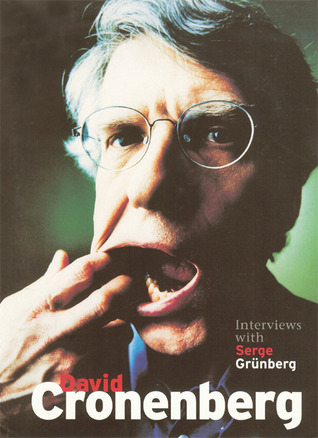A book of interviews with the inimitable David Cronenberg, very similar to the Chris Rodley edited CRONENBERG ON CRONENBERG. That volume was and remains the definitive Cronenberg interview book, but this new one is worth your time, if for no other reason than it’s more up-to-date than Rodley’s early-nineties publication.
David Cronenberg, as I shouldn’t need to inform you, is the Canadian filmmaker who over the course of a remarkable four-decade career crafted genre classics like SHIVERS, THE BROOD, SCANNERS, VIDEODROME, eXistenZ and A HISTORY OF VIOLENCE. The interviewer Serge Grunberg is a Montreal based critic, and evidently a close friend of his subject, judging by the chumminess of their exchanges.
As he already proved in the Rodley book, Cronenberg is an irrepressible orator. At times it’s difficult to tell who’s the interviewer and who the interviewee, with Cronenberg frequently taking over the interchange and Grunberg’s queries reduced to such morsels as “Yeah,” “Absolutely” and “Where were we?”
Unlike many of his contemporaries, Cronenberg isn’t at all shy in dissecting the political and philosophical underpinnings of his art. The unique body-centered vision displayed in his films (which gave us the term Cronenbergian) doesn’t appear to be the product of an unexplainable subconscious process a la David Lynch, but rather the outgrowth of a querulous and wide-ranging intellect. Topics Cronenberg discusses here include C.S. Lewis, Ivan Reitman, radical feminists, Philip K. Dick, his own messy divorce (the inspiration for THE BROOD), censorship in all its permutations, and the year’s worth of work he put in on TOTAL RECALL, which was ultimately directed by Paul Verhoeven—a movie Cronenberg “didn’t think much of.”
That’s not the only film Cronenberg doesn’t like. KRAMER VS. KRAMER, which many view as the inverse of THE BROOD, is “the most false, sentimental, bullshit movie ever.” THE MATRIX, which was released around the same time as eXistenZ, is “juvenile” with “no visual coherence at all.” And then there’s BLADE RUNNER, a “very flawed movie,” and SHAKESPEARE IN LOVE, which “really annoyed me.”
Clearly this guy isn’t afraid of speaking his mind, and that’s a quality in his favor—and the book’s. In its disfavor, it’s a little disjointed: Cronenberg has a tendency to run off at the mouth, rarely ever sticking to a single topic, and Grunberg has a difficult time reigning him in. But then Grunberg’s intent seems to have been to capture the personality of his subject as well as his thoughts on his art, and he seems to have accomplished that goal. No, I’ve never met David Cronenberg and so can’t say that for sure, but I’m willing to give Mr. Grunberg the benefit of the doubt in this case.

